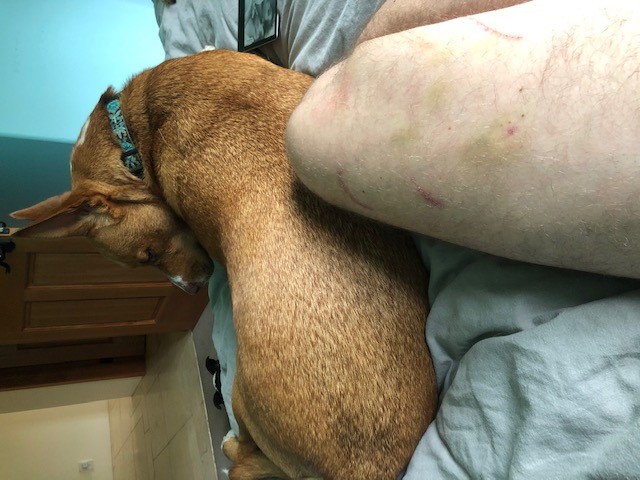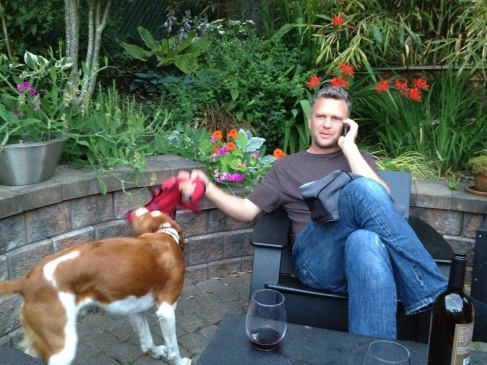The last few years of my life have been challenging. The last year of my life has been my most difficult year to navigate yet. Here is how it all started:
One year ago my husband informed me that he was leaving me. Initially I believed that things had been sort of rough so he just needed to take some space, maybe go on a trip or rent an extended stay suite. He quickly disabused me of that notion by informing me that he had signed a year-long lease on an apartment a few blocks away. At the time we had an open access cell phone policy. At the time I thought this was a good idea. I no longer do.
Through reading his text messages I discovered a text to his sister that informed me that he was leaving me for good. I also discovered his many texts to his new lover (almost twenty years younger than me).
I began all the negotiating, bargaining, and questioning that lovers who are being left often engage in. We had spent seventeen years together. Wasn’t that worth something to him? None of it mattered. He was done.
A few months later after almost complete silence from him, with prompting from my father and wise family, I filed for divorce. It was clear that he wasn’t going to do it. Throughout our years together he had maintained an uncanny knack for avoidance. He avoided his family of origin for seventeen years. During this time I purchased almost all holiday and birthday presents for his family. He felt a sense of responsibility to them, but he wanted nothing to do with them. Intuitively, I knew that this was the new status to which I had been relegated. I had been relationally disposed of. It took me months, and a great therapist, to come to terms with my new reality. I had been discarded and rejected by the person I loved most in the world.
To add insult to injury, I was three chapters into my dissertation (which he had been editing for me) and I was teaching at a local community college which meant that I would have no income for the summer months. He left me with our dog who was severely traumatized by his departure (he lost almost all of his fur, in spotty sore blotches all over his skin, over the next few months), in a very lonely home. For months afterwards I woke up crying every morning in our awful bed, in a condo that we had purchased together, I felt profoundly alone. This space, that I had initially adored, had become a horrific prison of memories for me.
I scraped together my resolve, got a summer job at a local winery (luckily he continued to pay some of our expenses–but there wasn’t much left over afterwards), and continued working on my dissertation. Despite my heart being broken I was able to finish my doctorate that fall.
However, my life was about to be even more complicated by even more drama.
In 2017 I had been asked by a friend to apply to teach at the local community college. At the time I had about 12 years experience teaching in higher education as well as a twenty year history as a mental health counselor.
Within the first two weeks of arriving at the college it became apparent that the practices of the counselors there were not aligned with the state and federal requirements for counselors. Additionally, only one of the counselors there was actually licensed. However, all the counselors were practicing as if they were independent counselors. However, there were some huge gaps in understanding of standard counselor practice. For example, a student was raped off campus during those first couple of weeks of my arrival at the college. A well-meaning, but terribly untrained and ill informed counselor within the department sent an e-mail (containing the student’s name and personal details) to over fifteen individuals within the college. This was a gross violation of the students’ privacy.
At that time I became deeply concerned about some of the “cultural practices” within the department and subsequently shared these concerns with my supervisor (who did little to nothing to act on them). After this there was a great deal of pushback from the counselors within the department who were upset that I had discussed the situation directly with my supervisor. Several of them began a “campaign” to discredit me. First, a complaint was made to the union about me alleging that my attempts to bring the department into alignment with state and federal law constituted an “act of a supervisor.” The union discarded the complaint stating that it was too technical to deal with and referred the complaint back to the administration.
It was now December of 2018. My husband had left, I was prepared to defend my dissertation in two weeks. I received a letter from the HR department at the college stating that a complaint had been made against me for an alleged Title IX violation, and that I was going to be investigated for allegations of gender harassment and bullying made against me by another counselor in my department. My office was quickly relocated outside of the counseling department. The next few months were painful and embarrassing.
Just prior to the end of the investigation the lead counselor in the department disseminated new standard intake forms for all of the counselors in the department to use. I noticed that these forms did not comply with the requirements established for counselors by the state Department of Health. I noted this discrepancy to the lead counselor and my supervisor. I was told that the documents were approved by the attorney general (AG) assigned to the college. When I continued to challenge that I didn’t believe that the AG had the authority to approve documents that weren’t compliant with the law I was told that I could use whatever paperwork I wanted.
Two weeks later the investigation was closed as being unfounded (e.g. I didn’t do any of the things that had been alleged that I had done). One week later I received a curt notice from my supervisor stating that my contract was being shortened from a full academic year. I would be unemployed in 30 days.
It was now the end of February 2019. I had been actively searching for a job since the beginning of January (but with little luck). I decided to hire a job coach and also pursue a potential labor law suit against the college.
Currently my labor lawyer states that while I have an excellent case, it may not be “cost-effective” to sue. However, the firm is still exploring the possibility that I could possibly be awarded “damages” due to my professional reputation being marred by an egregious allegation.
I hired the job coach. It is now the beginning of May. In the last four months I have applied for over 200 positions but have only received two interviews (for positions that I did not receive). I decided to take a break from the job coach (e.g. it doesn’t seem viable to keep doing the same thing that isn’t working).
I still see my therapist weekly. I am on some heavy duty antidepressants, my new WONDERFUL boyfriend sleeps over a few times a week and his dogs live with me now (my dog is doing MUCH better now that he has a new “pack”). I have been unemployed since the end of March 2019. For the first time in my life, I receive unemployment checks. In the next couple of months my divorce will be final. I will lose my condo. I will lose my health insurance. I am hoping that I will have a new job by then but hope seems very emotionally expensive at the moment.
I am struggling with sadness, loss, fear, and anger. I am struggling with feeling cursed. I am struggling with being “positive” and “happy.”
I hold a doctorate in education, I have had years of being a relatively effective mental health counselor in private practice. I am adept at understanding concepts like Dweck’s “growth mindset” (if you believe you can, then it is much more likely that you can). I am applying for positions as a Learning and Development Specialist/Manager/Coach. I have successfully navigated the periphery of this job title for years. The concepts are not new to me. For years I have also been utilizing Seligman’s (2011) “Positive Psychology” as a framework for working with students and clients. On LinkedIn these ideas and slogans are plastered on the pages of my coaching and development peers. Everywhere I see the slogans posted that when condensed read: “Negative Thoughts=Social Withdrawal=Failure”/”positivity leads to extroversion, engagement, a positive attitude, and productivity.”
Full disclosure, I have always been a bit of a pessimist. I, unapologetically, consider myself to be a member of the house of Slytherin (slogan: do what must be done). However, I am also a strong advocate of Positive Psychology. There is simply too much evidence that suggests that, for the most part, it works. My problem, at the moment, is that I am struggling with sadness, loss, fear, and anger. I am struggling with feeling cursed. I feel broken. The academic skeptic (pessimist) in me is (uncomfortably) challenging my chosen professional framework. I am now asking a lot of questions. What happens when we cannot feel happy? What happens when we feel trapped by circumstances over which we have little/no control? Is the Positive Psychology framework really just an old school capitalist propaganda tool used to shift responsibility from broken and toxic organizations to the individuals who struggle to navigate within them?
I’m currently reading Kashdan and Biwas-Diener’s (2014) “The Upside of Your Dark Side: Why being your whole self-not just your “good” self-drives success and fulfillment.” In it the authors ask the question, “Has Happiness Been Taken Too Far?” Their conclusion: Perhaps!
The authors cite research that suggests that positive emotions and thoughts are not always useful. Specifically because:
- Your happiness can interfere with long-term success.
- The pursuit of happiness sometimes backfires, ending in unhappiness.
- Sometimes people want to feel bad.
- Someone else’s happiness can impair your performance.
Their first assertion was interesting (essentially happiness can lead to naivete that can create longer-term blind spots). But the author’s third and fourth points are what are resonating deeply with me at the moment.
Sometimes People Want to Feel Bad
It turns out that most of us have an intuitive understanding of the function of negative emotions and that sometimes we select these “down” states in order to achieve a goal. The authors gave an example that given the choice of music before confronting a perpetrator, most individuals don’t want to listen to soothing music. 33 percent of individuals even chose “hard-core” acid rock to get “pumped up” for the confrontation. The authors state that emerging research clearly establishes that:
Anger trumps happiness when trying to confront a wrongdoer,
Anxiety trumps happiness when taking precautions against danger, and
Sadness trumps happiness when securing help to handle loss or personal difficulties
My take away is not so much that I “want” to feel bad at the moment, but that feeling bad might be my brain’s wonderful way of making sure that I will be o.k. given the difficult events that I have experienced during the past year (as uncomfortable as my feelings are at the moment, I’d like to make a quick shout out to my brain–thanks for the protection–however uncomfortable it might feel at the moment).
Someone Else’s Happiness Can Impair Your Performance Too
The authors suggest that happiness can lead to “big picture” thinking (e.g. project managers) and that unhappiness leads to detail oriented, analytical thinking (e.g. detectives). Researchers found that when a leader (who appeared to be sad) assigned an analytical task, followers completed the analytical task 400 percent better than their peers with a “happy” leader. This idea was replicated in another study where participants were asked to complete a boring, but crucial task (e.g. sit in a chair and determine whether or not two “planes” were about to collide). In one group the leader was a cheerleader (emphasizing how well each person was performing). In the other group, the leader was more “real” and acknowledged that the task was boring but that they would all “get through” the painful ordeal together. In this study the participants with the commiserating leader not only performed better but also rated the task as more enjoyable. The authors’ conclusion: “do not create a culture based on the assumption that positivity must reign supreme. Instead create a culture where everyone knows that it’s safe to be real, and depending on the situation, it is sometimes better to feel something other than happiness.”
Professionally, I believe that the events of the past year have made me a much wiser mentor and leader. Hopefully, when I return to the workforce (and I am REALLY hoping that this is sooner versus later), I will have a deeper, more informed perspective about happiness and how it relates to the REAL lives of the individuals with whom I engage, teach, and develop.
My personal take away is a deep challenge to try to start accepting my “darker” thoughts and moods these days. The research suggests that this state of mind may actually be protective for me on a long term basis. So hang in there with me family, boyfriend, therapist, and lawyers. This current crisis is bound to end eventually–and the research suggests that I’ll be better off (happier?) because of it!








